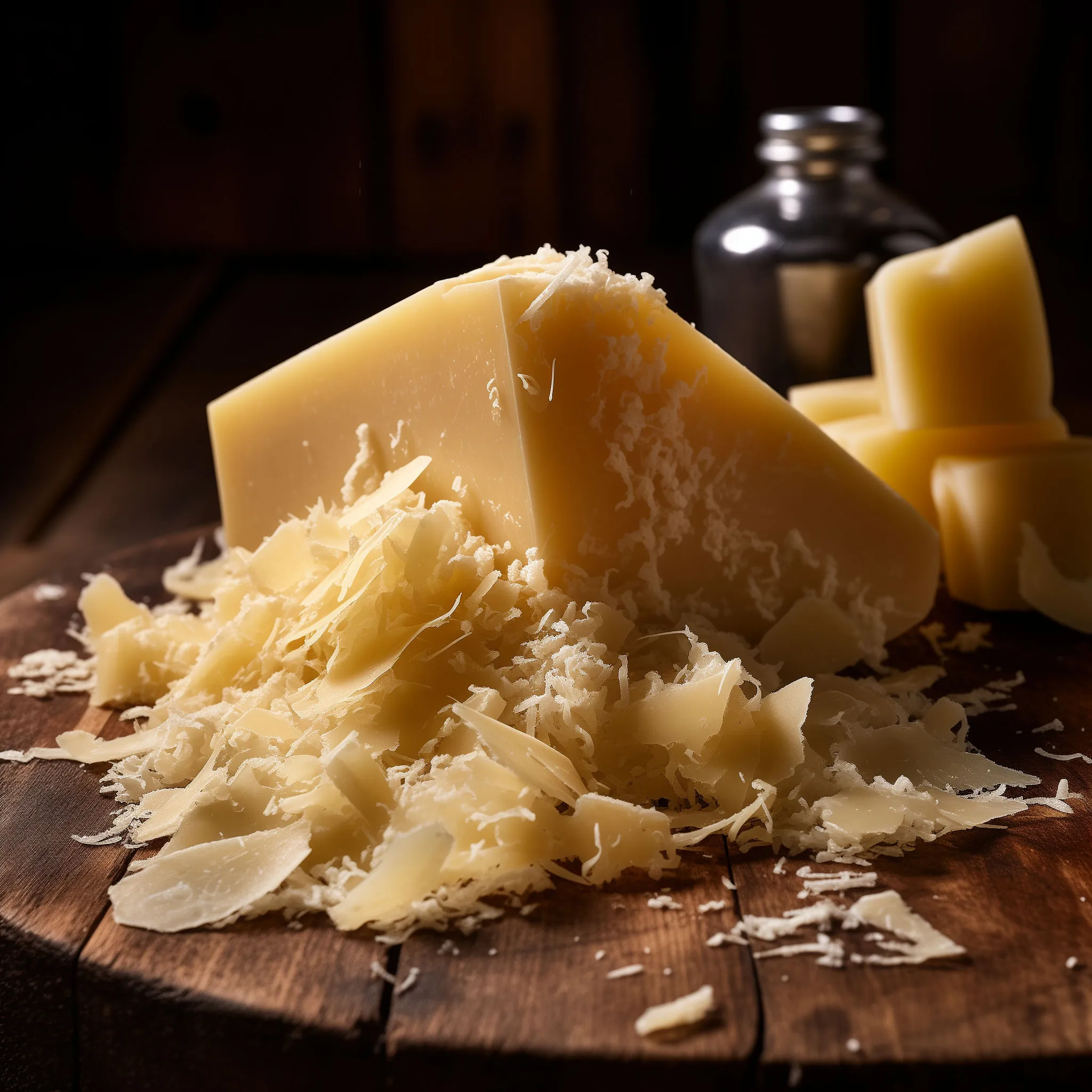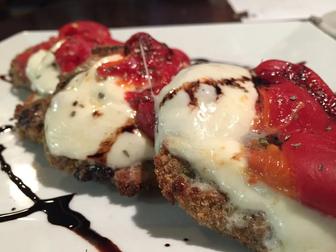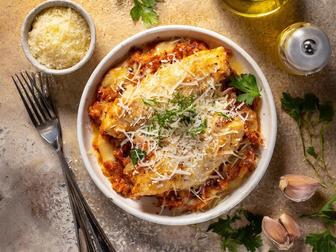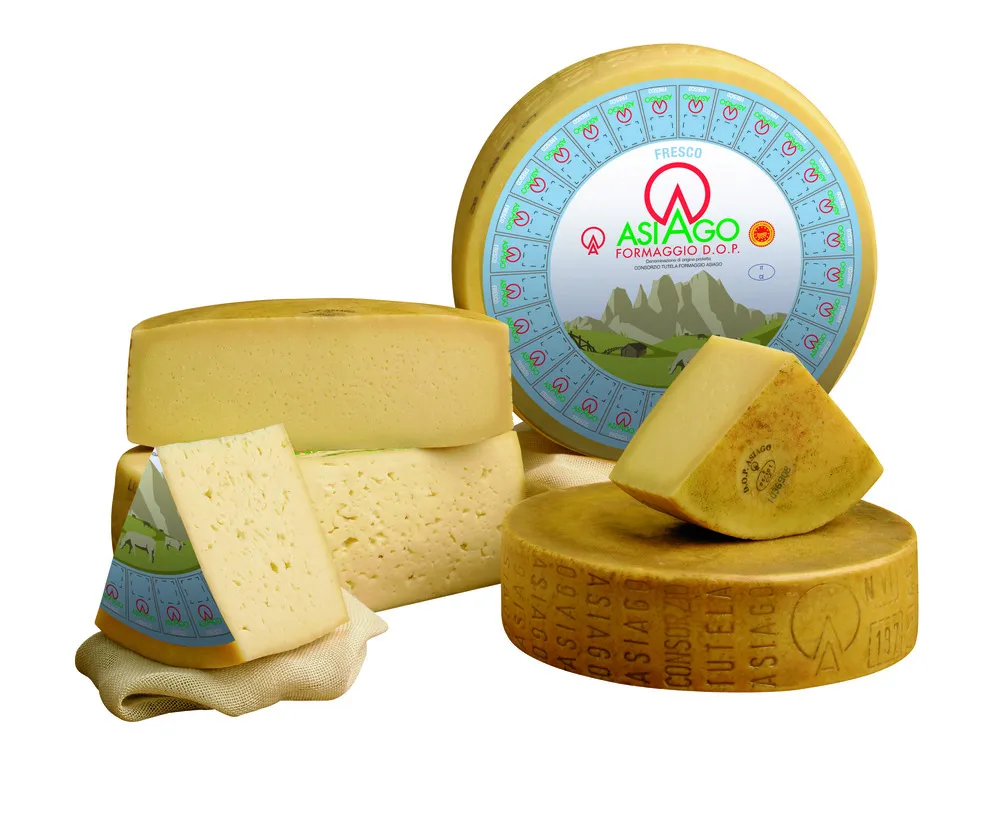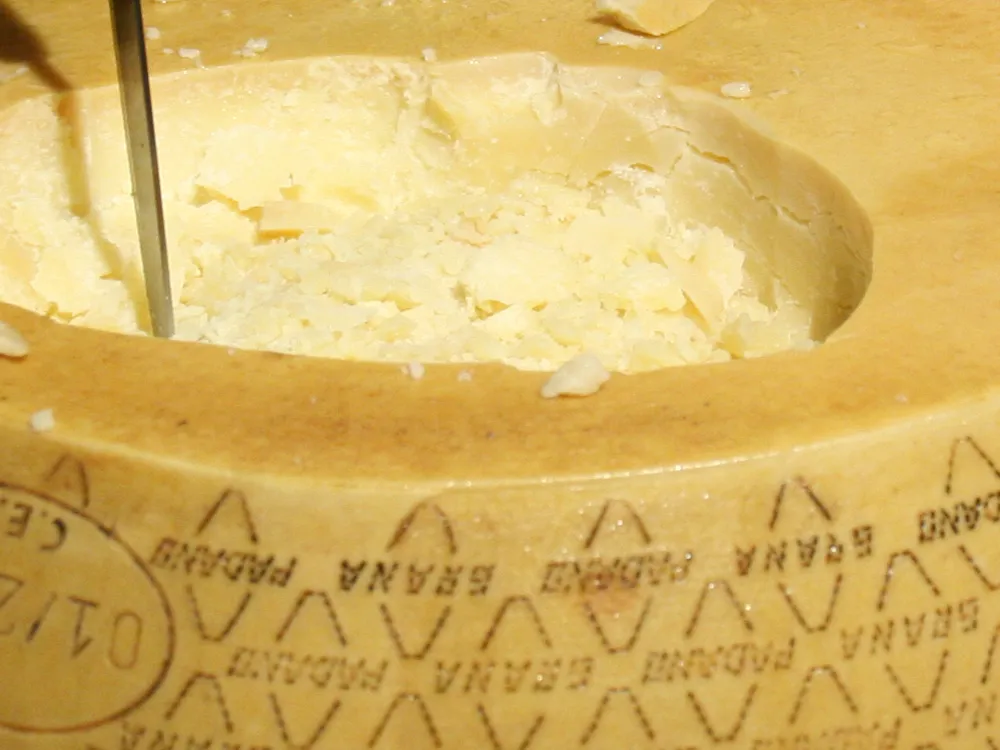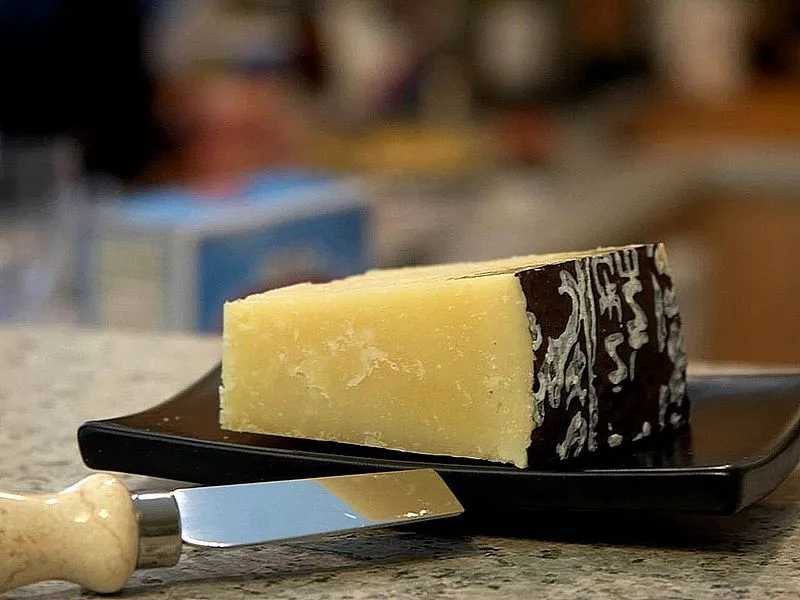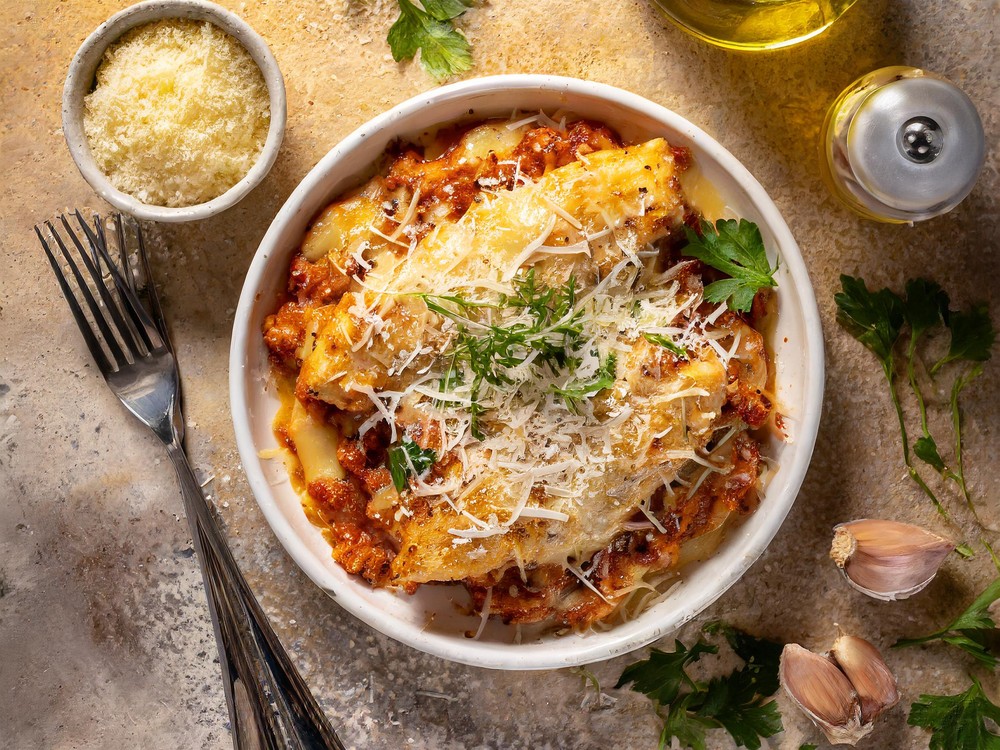Parmesan Cheese
What is Parmesan Cheese and What Is Special About Parmesan?
Parmesan cheese – or, to give it its full Italian title, Parmigiano-Reggiano – is one of the world's most popular and beloved cheeses. Known as the king of cheeses, Benedictine monks from the Parma-Reggio region of Italy stumbled upon the recipe through trial and error over a thousand years ago. The cheese is so valuable that one Italian bank accepts wheels of parmesan as collateral. Indeed, in 1666, during the Great Fire of London, famed diarist Samuel Pepys rushed into his garden and buried his most prized possessions: gold, notes, and a wheel of parmesan cheese.
The production of Parmesan cheese is not just a process; it’s a labor of love. Each step, from the meticulous selection of the milk to the patient aging process, is a testament to the dedication and skill of the cheesemakers. It is this devotion to their craft that gives Parmesan cheese its exceptional taste and texture.
Parmesan is special because it is protected by a PDO status, meaning it must be produced following specific traditional methods in designated regions of Italy, including Parma, Reggio Emilia, Modena, Bologna to the west of the Reno River, and Mantua to the east of the Po River. There are similar cheeses, such as Parmesan-style or Grana Padano, which are less expensive alternatives.
The cheese is often grated and sprinkled on pasta dishes, salads, and other Italian and Mediterranean dishes. It's a key ingredient in dishes like spaghetti carbonara and risotto.
What is the difference between Parmesan and Parmigiano Reggiano?
Parmigiano-Reggiano is a specific cheese from Italy, made in designated regions under PDO status, while Parmesan refers to similar hard cheeses made outside specific regions, often following similar methods but without following PDO regulations.
Ingredients: While Parmigiano-Reggiano is traditionally made from raw cow's milk, Parmesan-style cheeses may use pasteurized cow's milk or a mixture of different milk, which results in variations in flavor and texture.
Aging: Parmigiano-Reggiano is aged for a minimum of 12 months or much longer periods, which contributes to its complex flavor profile. Parmesan-style cheeses may have varying aging times.
Flavor and Texture: The flavor and texture of Parmesan-style cheeses vary depending on the production methods, aging process, and type of milk used. While some may closely resemble the nutty, savory flavor and granular texture of Parmigiano-Reggiano.
How Is Parmesan Cheese Made?
Production of the cheese is a labor-intensive process that involves time, skill, and precision. It starts with high-quality cow's milk — approximately 550 liters per wheel — from specific Italian regions, such as Parma, Reggio Emilia, Modena, Bologna, and Mantua. Natural whey culture and rennet are added to the milk to kick-start the chemical reactions that form the basis of all cheese making.
Once the curds form, they are broken into granules using a special cheesemaking tool called a spino. The mixture is then heated to 55 degrees centigrade for around an hour, after which the curds are separated from the whey and formed into a single mass.
Wrapped in traditional linens, the whey is pressed into large molds to give the cheese its distinctive shape. The cheese is then branded with a unique, traceable code that proves its authenticity and left to settle for a few days. Next comes the brining; artisans submerge the wheel in brine, which enhances its flavor and helps preserving it for the extensive aging process.
The minimum maturation period is 12 months, but some wheels mature for 40 months or more. They are stored in temperature and humidity-controlled conditions and carefully turned and brushed during regular inspections to ensure they have the best possible chance of meeting the high quality expected of them. Experts also continuously monitor them by tapping the wheels with a hammer and listening for hidden defects deep within the cheese.
The attention lavished on each wheel helps it develop a complex flavor profile and bring to the fore those nutty, salty, and savory notes that make parmesan cheese so unique.
What Is Parmesan Cheese Made Of?
For all the work put into making it, Parmesan cheese has only three ingredients: cow's milk, salt, and rennet. The milk used is raw and of the highest quality; this is important because the conditions in which it is produced greatly influence the final taste and character of the cheese.
An organization known as the Consorzio del Formaggio Parmigiano-Reggiano provides oversight and lays down a number of ground rules that every producer of parmesan must abide by. Stipulations include the aforementioned sourcing of the milk -- which must come from cows fed primarily on local grass -- and restrictions on which areas are allowed to produce the cheese.
Is Parmesan Cheese Healthy?
Despite its rich and intense flavor, Parmesan can be a healthy addition to your diet. Nutrient-dense and packed with protein, calcium, phosphorus, and vitamins, it is also high in fat and sodium and is used sparingly for this reason. As always, moderation is key.
Its high calcium content - which can contribute to strong bones and teeth - is particularly beneficial to human health. The proteins within the cheese also provide the building blocks for several essential amino acids that help support muscle growth and repair.
Parmesan cheese is a versatile ingredient in cooking. It is often grated over pasta dishes, salads, and soups to add a savory note and a punch of umami. It also finds its way into several sauces, such as the classic Italian Alfredo, or is sprinkled on roasted vegetables for a delicious finishing touch. Some chefs add it to their pizza, sprinkling a little grated parmesan over the tomato sauce before layering mozzarella and other toppings.
Of course, although Parmesan cheese is a delicious and nutritious choice for some, individuals with lactose intolerance or dairy allergies should avoid consuming it. It is always best to consult a healthcare professional if you have specific dietary concerns or restrictions.
How Many Calories In Parmesan Cheese?
Parmesan cheese is low in calories compared to many other types of cheese, especially since – as a concentrated source of flavor – a little goes a long way. On average, a one-ounce (28g) serving of Parmesan cheese contains between 110 and 120 calories.
It is important to note that the calorie content can vary slightly depending on the specific brand or variety of Parmesan cheese. Additionally, the method of grating can affect the perceived volume and may affect the actual amount of cheese consumed.
Where Is Parmesan Cheese From?
Authentic Parmesan cheese, or Parmigiano-Reggiano, is protected by a designation of origin, meaning it can only be produced in specific regions of Italy. The production areas include Parma, Reggio Emilia, Modena, Bologna, and Mantua. These regions have the ideal climate, soil, and farming practices needed to produce the highest quality milk for Parmesan cheese.
Italian law strictly regulates the production and labeling of Parmesan cheese, ensuring that only cheeses made according to specific traditional methods and within the designated regions can bear the Parmigiano-Reggiano name. This protected designation of origin guarantees the authenticity and quality of the cheese.
How to Spell and Pronounce Parmesan?
The word "Parmesan" is spelled with an "s" in English, although it originates from the Italian word "Parmigiano."
The correct pronunciation of Parmesan is "par-muh-zahn," or ˈpɑː(ɹ).məˌzɑːn/. The emphasis is on the second syllable, and the "g" sound is usually softened. This English adaptation of the Italian word for this iconic cheese is used worldwide.

Over 200,000 page views per month, Put your store on our map!
Contact UsOther Italian cheeses:
Eggplant Parmesan Recipe
Embark on a culinary journey with our Eggplant Parmesan, a classic Italian dish that transforms humble eggplants into a flavorful masterpiece. This recipe, serving four, …
Chicken Parmesan
Savour the classic comfort of Chicken Parmesan with this easy recipe designed for two. With just 15 minutes of prep and 25 minutes of baking …
Parmesan cheese has a rich, nutty flavour with a firm and crumbly texture. Here are three wine types and cracker options that generally pair well with Parmesan:
Wine Pairings:
- Chianti (Sangiovese): Chianti, particularly those made from Sangiovese grapes, pairs well with Parmesan. The wine's acidity and tannins complement the …
While Parmesan cheese is a popular ingredient in many dishes, known for its distinct nutty flavor and granular texture, there may be times when you don't have this cheese on hand. Fortunately, several substitutes for Parmesan cheese work well as alternatives, offering a similar flavor profile and texture that you …
Read MoreParmesan Q & A
-
Is Parmesan Lactose Free?
Many people with lactose intolerance can tolerate hard, aged cheeses like Parmesan because they contain virtually no lactose. During …
Read More -
Is Parmesan Vegetarian?
If you follow a vegetarian diet, you may wonder if Parmesan cheese suits your dietary preferences. Traditional Parmesan cheese, …
Read More -
Is Parmesan Cheese Gluten Free?
If you follow a gluten-free diet or have gluten sensitivities, you'll be happy to know that Parmesan cheese is …
Read More -
Does Parmesan Cheese Melt?
One characteristic that sets Parmesan cheese apart from other varieties of cheese is its relationship with melting.
When heated, …
Read More -
How To Store Parmesan Cheese
Proper storage is essential to keeping the flavor and texture of Parmesan cheese at peak levels. To prevent it …
Read More -
How Long Can Parmesan Cheese Sit Out?
Most cheeses should only be left at room temperature for two hours. Parmesan, however, like other hard cheeses, is …
Read More -
Can You Freeze Parmesan Cheese?
If you have an abundance of Parmesan cheese, you may wonder if it's possible to freeze it to extend …
Read More -
Can Dogs Eat Parmesan Cheese?
As a dog owner, you might be tempted to share your love for Parmesan cheese with your furry companion …
Read More -
Can Cats Eat Parmesan Cheese?
If you're a cat owner, you might wonder if sharing a little Parmesan cheese with your feline friend is …
Read More -
Can You Eat Parmesan Cheese While Pregnant?
Many women are concerned about the foods they eat and whether they are safe for their babies during pregnancy. …
Read More - How to Make Chicken Parmesan?
-
How long does Parmesan cheese last in the fridge?
Parmesan cheese has a relatively long shelf life, especially if stored properly. When stored in the refrigerator under the …
Read More


